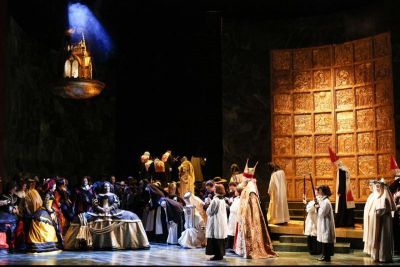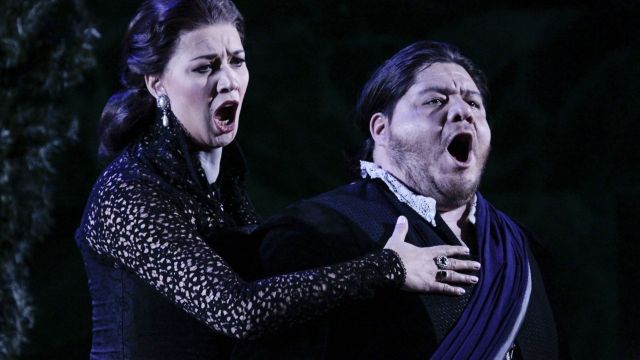Don Carlos
At first blush an epic opera stretching over four hours, with extended helpings of statically performed arias, sung against the background of towering cold marble, might be one only for the purists.Yet this production of Don Carlos was filled with so many moments of spectacle and sweet singing that no prodding was needed to keep the eyelids open.
Opera Australia has not staged this extraordinary production for almost twenty years. The set by Paul Brown is a towering marvel. It gives the feeling of an extraordinary Cathedral, with sculpture and treasures from the ground to the ceiling. Modelled on Velazquez’ paintings of the Spanish court and it teases with light, shade and grandeur.
The most lavish of costumes are on parade, including dresses that appears to be so wide as to require a ‘danger wide vehicle approaching’ warning sign.
Giving justice to Verdi’s rousing chorus were reinforcements from volunteers, bolstering numbers and giving the appearance of a vast populace.
 Certainly when Verdi penned Don Carlos having access to lots of people was not a problem. The Paris Opera gave him eight months with a full ensemble to workshop the Opera. Hours could be spent debating fine details such as the angle a cast member held his or her arm aloft (yes they don’t make Operas the way they used to).
Certainly when Verdi penned Don Carlos having access to lots of people was not a problem. The Paris Opera gave him eight months with a full ensemble to workshop the Opera. Hours could be spent debating fine details such as the angle a cast member held his or her arm aloft (yes they don’t make Operas the way they used to).
The central plot itself is relatively simple. In the Royal court of Spain, Elisabetta is betrothed and in love with the prince Don Carlos, but she is forced to marry his father instead when he ascends to the throne. Just add a few layers of royal intrigue, an uprising from the Flemish people and torture Spanish inquisition style.
The romantic leads were cast for their towering voices, rather than looking like lovers from the Spanish court. The compact Mexican tenor Diego Torre ( Don Carlos ) was swooning over the Afro-American Soprano Latonia Moore(Elisabeth de Valois.)
But members of the audience did not need to suspend belief for other principals, who both looked and sounded the part.
Gaining the biggest ovations were arias in the later part of the Opera from Ferruccio Furlanetto as Philip II (Elle ne m'aime pas / Ella giammai m'amò) and the absolutely perfectly cast Australian baritone of Spanish/Italian descent José Carbó as Rodrigo, giving a thrilling rendition of Per me giunto.
I could have listened to music that like for another four hours.
David Spicer
Images: Milijana Nikolic (Princess Eboli) and Diego Torre (Don Carlos) & the company in Opera Australia's Don Carlos. Photographer: Jamie Williams.
Subscribe to our E-Newsletter, buy our latest print edition or find a Performing Arts book at Book Nook.

